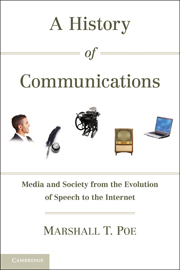Preface
Published online by Cambridge University Press: 05 June 2012
Summary
Preface
I suppose it would be fair to say that I began writing this book in 1989, when I had the good fortune of working for Professor Albert Lord just before his death. Professor Lord, together with his colleague, Professor Milman Parry, had, many decades earlier, revolutionized Classical scholarship by proposing that “Homer” was not a writer, but an oral tradition. In a series of landmark studies, Professors Lord and Parry showed that the traces of oral composition – in this case, singing – could be seen in the texts of the Iliad and the Odyssey. Honestly, it was all lost on me. I was just there to keep Professor Lord's office uncluttered and sort his mail. Since his office was already uncluttered and he sorted his own mail, I was often left with free time. I used it to look through Professor Lord's library. In it, I found several books devoted to the study of the media and their effects by Marshall McLuhan, Jack Goody, and others. Having nothing better to do except work on my dissertation, I read them and was rather taken away. These early communications theorists made all kinds of fascinating claims about the impact of the media on, well, everything. I didn't know whether they were right or not, but I decided I could use their sexy ideas to make my own pedestrian research seem “theoretically informed,” which, to that point, it was not. The result was a series of articles that, thankfully, have passed from obscurity into still deeper obscurity.
Thereafter, I thought nothing of the media until, by another lucky stroke, I landed a job in it at The Atlantic Monthly in 2002. I was part of a small team that the owner of the magazine, David Bradley, had given the humble task of preparing the storied magazine for the twenty-first century. You will not be surprised to learn that the thing principally on our minds was the Internet and the question principally on our lips was “What will it do?” I was immediately reminded of my lazy days in Professor Lord's well-kept office and the reading I had done there. Upon quick review, I concluded that the early media theorists had left me – or rather us – singularly unprepared to understand the Internet. What wisdom did they have to impart about, say, the birth and explosion of Wikipedia? None that I could see. More recent media theorists proposed that the Internet was incomprehensible by the lights of older theories because it was new. They said that we had never seen anything like the Internet in world history, that it “broke all the rules.” I suspected that these theorists didn't know very much about world history or the supposedly shattered rules. With this in mind, I began to try to understand the Internet historically; not as something brand new, but as the most recent iteration of something very old – the appearance of a new medium. It had, after all, happened before. First we spoke. Then we wrote. Then we printed. Then we listened to the radio and watched TV. And now we surf the Internet. Each of these media was different from the others, but all of them were of a piece – tools that we used to send, receive, store, and retrieve messages. The Internet, it seemed to me, was not so much brand new as a variation on an ancient theme.
- Type
- Chapter
- Information
- A History of CommunicationsMedia and Society from the Evolution of Speech to the Internet, pp. ix - xPublisher: Cambridge University PressPrint publication year: 2010



